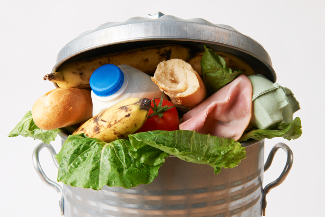Member State Page : Ireland
Last updated on the 29/09/2023

The EPA estimates that Ireland generated 766,000 tonnes of food waste in 2020.
In total in 2021: 753 081 tonnes of food waste

In 2020
Primary production: 70,400
Processing & manufacturing: 215,000 tonnes Retail & distribution: 61,000 tonnes
Restaurants & food services: 178,500 tonnes Households: 241,000 tonnes

Halve food waste by 2030
Contact point
Target
- Ireland’s waste action plan for a circular economy (Ireland’s national waste policy 2020-2025) includes a number of food waste prevention measures. A National Food Waste Prevention Roadmap will be published by the Irish Government later in 2022, with details of actions to halve Ireland’s food waste by 2030.
Measure
Ireland is carrying out work to establish reporting methodologies for each sector and develop baseline data in accordance with protocols established by European legislation. In line with EU reporting obligations, Ireland published the first estimate of food waste levels in 2020 using the EU reporting methodologies.
An EPA-funded research project, Efficient Food, identified potential data sources and improved knowledge of food loss and waste in primary production. Studies are also underway to develop a finer scale understanding of available data in the processing and manufacturing sector.
Robust and consistent measurement of food waste is the first step in food waste prevention, as it provides quality data to monitor food waste generation, support food waste prevention initiatives and report on progress to reduction targets. Through the national waste prevention programme, the EPA is leading work with food business operators to improve the quality of the data for each stage of the food supply chain and use target-based approaches to drive improvements in food waste levels. Companies are encouraged to monitor and track food waste and report on progress and achievements to reduce it, by using standardised measurement protocols (soon to be published):- A Food Waste Measurement Protocol to support food and drink manufacturers to identify and quantify their food waste streams and put in place actions to reduce their food waste.
- The Food Service Pathway is a four-step pathway for hospitality businesses to estimate food waste in a consistent way, track performance & identify how to reduce food waste.
Act
The food waste prevention programme is implemented through the Circular Economy Programme, led by the Environmental Protection Agency (EPA). The programme delivers campaigns and supports targeting food waste in households, across the retail, distribution, processing and manufacturing sub-sectors and in the hospitality sector, with a view to achieving the national target for a 50% reduction in food waste by 2030.
- Household food waste: actions include awareness raising activities through the stopfoodwaste.ie website and application of behavioural insights to achieve widespread public awareness of environmental and social issues around wasted food; in order to achieve a significant increase in the number of people taking action on the issue.
- Supply chain and hospitality: activities to drive change across the retail, distribution, processing and manufacturing sub-sectors, and reducing food waste in the hospitality and food service sectors. Previous actions focused on working with the retail sector. In 2018, five major grocery retailers (representing nearly 70% of the Irish grocery market), pledged to work towards a common and long-term approach to tackling food waste in the sector by signing the ‘Food Waste Charter’. The Charter is the foundation for action, requiring committed organisations to follow a framework of Pledge > Measure > Reduce > Report. Following a review of the programme in 2020, work is underway to establish an appropriate model that will drive industry commitment to food waste reduction targets, and build on the activities to extend the reach across the whole supply chain. Initial actions are focused on roll-out of a standardised measurement methodology, and developing tools and resources for upskilling for action on food waste prevention. The National Food Waste Prevention Roadmap will be published by the Irish Government later in 2022.
- Data and evidence: Behavioural insight is a foundation of the programme, providing evidence and data to inform policy, behavioural change interventions and awareness campaigns, establish sectoral benchmarks and indicators, and to monitor progress. These insights include:
- baseline information studies
- national surveys on behaviours and attitudes
- analysis of waste characterisations and national waste data.
Robust and meaningful data on food waste is central to building a compelling narrative on the benefits of preventing food waste and complying with national legislative reporting requirements. A key focus of the programme activities aims to improve data quality and availability in order to inform the implementation of activities and to monitor and assess their effectiveness.
Food loss and waste prevention is also covered as part of the agri-food strategy Food Wise 2025 for a sustainable food system. The 2030 agri-food strategy is currently being prepared and the draft strategy, which was subject to consultation, includes a focus on food loss and food waste prevention.
The Stop Food Waste programme is the national public-facing food waste prevention programme, which aims to inform and empower citizens to reduce food waste through the application of behavioural insights and awareness raising activities. In 2019, Ireland developed a resource pack for schools in collaboration with municipalities and education experts. EPA ran a national communications campaign (through social media, press, TV, radio etc.) in November 2020 to inform Irish citizens that by simply eating or freezing food up to its 'use by' date, they can make their food go further, save up to €700 a year and prevent food waste.
Ireland supports several research and innovation activities to identify, target and address the issue of food waste through various funding programmes including the EPA’s Green Enterprise programme, the Department of the Environment, Climate and Communications’ Circular Economy Innovation Grant Scheme and the Department of Agriculture, Food and the Marine’s Rural Innovation and Development Fund (RIDF).
An EPA funded research project, Food Path, commenced in 2020 to analyse the effectiveness of existing behaviour change interventions in Ireland and to trial alternative approaches to food waste prevention in households. Through the Smart Farming programme and the partnership between the Irish Farmers’ Association and Ireland’s national waste prevention programme, assessments of on-farm resource efficiency have taken place and potential savings and efficiencies have been identified.
Relevant resources
Links
